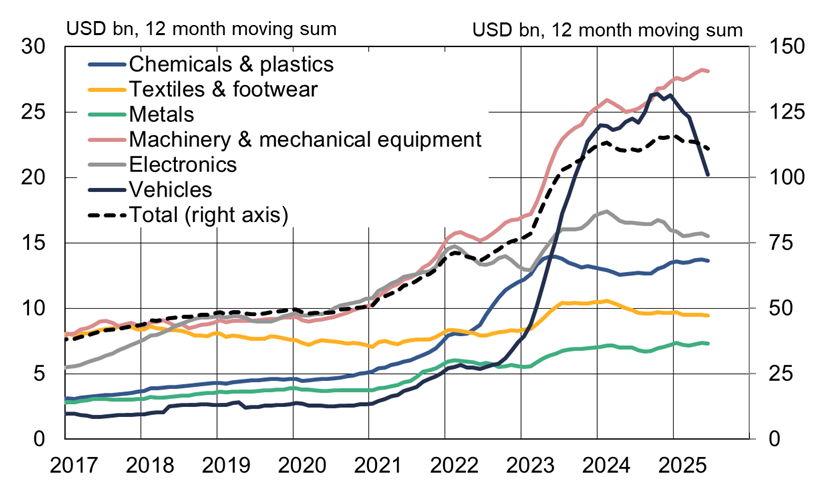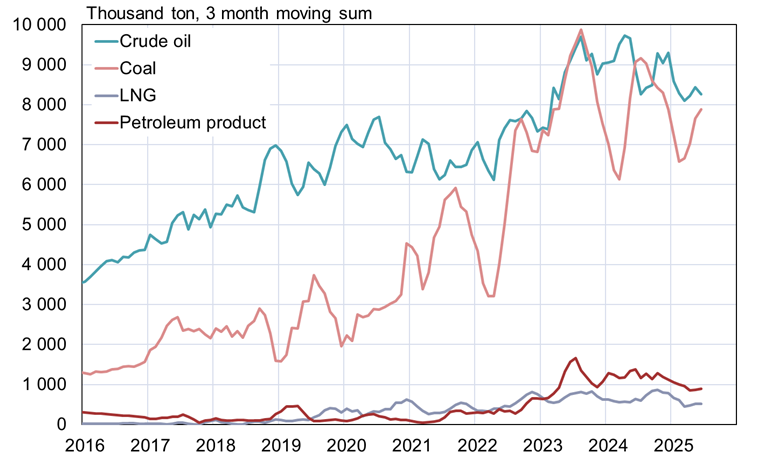BOFIT Weekly Review 32/2025
While China’s car exports to Russia collapse, other exports continue to grow
China Customs reports that Chinese goods exports to Russia fell overall by 9 % y-o-y in the first half of this year. Exports were burdened by a halving of car imports from the same period in 2024. Russia significantly raised its recycling fees for imported cars last October, and then further increased the fees at the start of January in order to protect domestic car production. After Western carmakers withdrew from the Russian market, Chinese cars quickly came to dominate car sales in Russia. Overlooking the vehicles, China’s exports of other goods to Russia continue to grow (4 % y-o-y in January-June). The growth has been driven by machinery and mechanical equipment exports, and in particular exports of machinery needed in production facilities have soared. For example, exports doubled for metal rolling machines, industrial ovens, industrial robots and various handling systems such as conveyor belts. Exports of distillation equipment increased sixfold. In contrast, exports of laptop computers, one of China’s top exports, fell by 38 % y-o-y.
Exports of Chinese machinery & equipment to Russia have risen, but car exports have plunged

Sources: China Customs, CEIC and BOFIT.
China’s goods imports from Russia contracted by 9 % y-o-y in the first half. Chinese imports consisted mainly of energy products. China Customs noted that the volume of oil imports from Russia declined by 11 % y-o-y in the first six months of this year, while coal saw a decline of 4 %, liquefied natural gas (LNG) a drop of 18 % and refined petroleum products a decline of 27 %. China ceased reporting its pipeline gas import volumes at the beginning of 2022, but the data on import value suggest that the amount of pipeline gas imports volume rose approximately by 20 % y-o-y. The Power of Siberia natural gas pipeline achieved full capacity utilisation of 38 billion cubic metres a year at the end of 2024 and the pipeline gas imports are expected to remain at current level. Despite the drop in oil imports, Russia accounted for nearly 18 % of China’s total oil imports in the first six months of this year.
Chinese energy imports from Russia slowed a bit in the first half of this year

Sources: China Customs, CEIC and BOFIT.
Due to the sanctions imposed on Russia, trade between the two countries has occasionally been afflicted with payment transmission problems. Although Russian media is full of stories about companies or people dealing with payment difficulties, it appears that Chinese and Russian parties have generally managed to find suitable alternative payment routes.
In recent months, a number of high-profile visits between the two countries have taken place. For example, president Xi Jinping’s visit to Moscow in May lasted a full four days. The groundwork for that visit was preceded in April with a visit to Moscow by foreign minister Wang Yi. Similarly, president Vladimir Putin is planning a four-day visit to Beijing at the end of August, with the groundwork laid in a visit to Beijing by foreign minister Sergei Lavrov in July. The increased frequency of meetings and official statements by the respective governments may indicate a deepening of cooperation between the two countries.